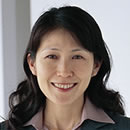The sixteenth lecture of the Global Carrier Lecture Series was given by Miho Ota, who is an associate professor at the Faculty of Comparative Cultures. Tamagawa University.
She talked about her volunteering experience during university that led her to her present job, with the Japan Overseas Cooperation Volunteers that she joined after graduation, and a project that she was promoting with her students focusing on reconstruction after the Great East Japan Earthquake.
At the beginning, she started talking about her experience during university that formed an essential part of her character. As a volunteer she was taking care of disadvantaged children in an orphanage while tutoring other children of wealthy parents. She planned to become a teacher even then, but she came to question the Japanese education system after seeing huge gaps.
In her last summer of university she thought about what kind of job she should take while seeing her friends struggle with finding a job. By chance she found a poster that was trying to recruit volunteers for the Philippines. She decided to join it. There were a lot of things that she experienced for the first time and she enjoyed learning from them. However, as she spoke to other volunteer workers a question arose in her “Should I have simply donated the 130,000 yen that I paid to join this volunteer activity?”
The workers and her couldn’t find an answer to that question so they asked a local person. The person replied, “We don’t want money. We just want Japanese people to know about the Philippines, and tell 10 other people around you about our situation.” These words motivated her to engage people by “telling.”
This experience got her deeply interested in foreign countries and after graduation she started to work in Ghana as a member of the Japan Overseas Cooperation Volunteers. When a plan to build a junior high school in cooperation with local parents was proposed she realized the importance of parents in education.
After returning to Japan, she started conducting activities to inspire mothers in developing countries like Mexico or Paraguay. The idea of a “School for Mothers,” which teaches mothers how to cook and do laundry, gave the audience a new point of view.
In addition, as she thought about wanting to support mothers in areas affected by the Great East Japan Earthquake, she has started “The Journey of Words-discovery Project” with students at Tamagawa University—they visit the affected areas, and hear local mothers’ stories.
She explained that she believed “A secure life for a parent makes a child’s life secure. So, making more mothers smile changes the future of education,” Her experiences developed her values and gave her energy to take action.
At the end, she gave a final message, “Isn’t it your turn? Take a new step!” She has been always learning from and looking at her own experiences; therefore, her messages were powerful and convincing. Her lecture gave the audience a chance to think about the importance of people taking action of their own free will.











